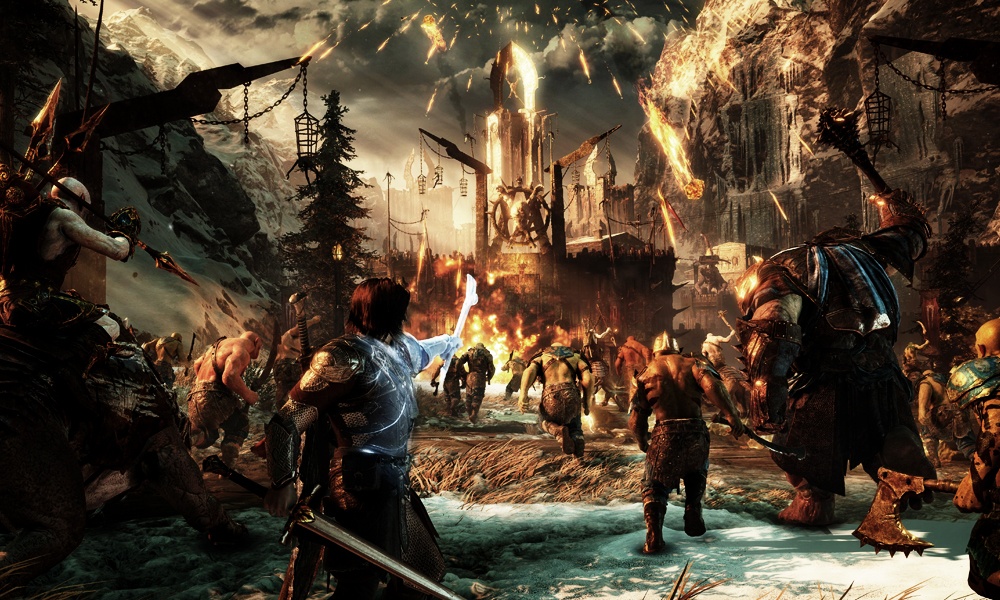This year’s E3 provided us with a good look at what the next year and a half or so of gaming is going to look like and overall, we’re optimistic. A lot of what’s coming out is some kind of a sequel or rerelease, but we’re okay with that, as most of these were sequels we were asking for anyway. We’re getting followups to some of our favorite games both this year and next, so we’ve already started secreting away money so people don’t judge us for our spending habits. If people ask, we’ll say we’re investing in clean energy startups or something, but really we’re basically being kidnapped by our consoles.
Also in a rare move, it was the AAA titles that got us most excited rather than the indie games. Normally indie developers are the ones taking big risks or injecting some fresh ideas into the gaming community, but this year it looks like the big devs grew a pair and shook up their old franchises. A whole bunch of tried and not so true series are getting some foundational changes and we’re finally getting a reason to care about them again. Here are the games from E3 that have us the most excited.
Uncharted: Lost Legacy
August 22
Switching to a new protagonist might actually be the right move for Uncharted. Not saying we don’t love Nathan Drake, but you can only have so many adventures with the guy before his survival is unlikely even in video game worlds or his involvement becomes far too contrived to be natural. With a new character, we can explore new areas, stories, mythologies, and villains without sacrificing the Uncharted franchise. As long as the new game fits into the larger tone of the series, we’re not opposed to controlling a new character.
If the trailers are to be believed, the new protagonist has a lot in common with Nathan Drake, so it won’t be a huge departure. And to be fair, Chloe Frazer isn’t exactly a new character for the series. She’s been in the games before, so we’re not even moving that far off of the established Uncharted formula.
Middle-Earth: Shadow of War
October 10
Video game tie-ins of any kind are generally cheesy cash grabs, so it’s a little surprising there are three on this list: Metro, Spider-Man, and Lord of the Rings. But Shadow of Mordor may have figured out how to do it, at least for larger, established properties. You have to make something independent of the original work, but that retains the spirit of the universe. Think of it this way. If Aragorn or Gimli had shown up in Shadow of Mordor, it would have been pandering fan service, but you can’t make the game without hitting the bigger points of Lord of the Rings.
Shadow of War seems to be taking this idea to the extreme. Possibly to the point where, if the games were to have actually happened, it’s hard to imagine the classic book series playing out the same way. We’re not complaining, as forcing orcs to go to war against each other is an awesome idea and we love doing it. We’re just saying we get where some people are coming from.
In any case, Shadow of War also seems to be addressing one of the shortcomings of the first installment. Namely, it was a 25-hour game with 20 hours of content. There was a decent amount of grinding you had to do and, sad to say, slaughtering orcs can get a little tedious after a while. But Shadow of War is ramping up its investment in the nemesis system and the orcs have gotten a lot more personality, plus huge conflicts are a constant part of the game, so boredom shouldn’t be a problem this time around. Not that it was a big one the first time anyway.
Assassin’s Creed Origins
October 27
Assassin’s Creed is long overdue for some fresh ideas. Initially we were big fans of what the series was doing, with the blending of near-future technology and almost ancient history. Plus the combat was fresh, the parkour was a ton of fun, and the settings always demanded exploration. But somewhere around ACIII we just stopped caring. The game wasn’t what we were expecting and the longer we played, the more bored we got.
That’s probably why we paid such close attention to the announcement of Assassin’s Creed Origins. It’s just about throwing away the staleness the series has built, instead opting to become more of an RPG than the cookie cutter action game of the series’ past. We have to applaud Ubisoft for taking the chance to reimagine one of their most successful series. It takes a lot to admit when something might not be working anymore, or at least not as well as you’d like it to.
Wolfenstein II: The New Colossus
October 27
Wolfenstein: The New Order is easily the most surprising video game we’ve ever played. We bought it thinking it’d be a decent, short, Nazi-killing romp, but when we booted it up, what we found was a game with a tightly written story, genuinely human characters, relatable conflict, and a strong emotional core. From the series that popularized the concept of Mecha-Hitler.
One of the things The New Colossus has on its predecessor is setting. The first game took place entirely in Europe, where we got to see the effects of a Nazi victory on the occupied countries. That was all well and good, but the US lost the war too, so we were itching to see what North America would look like under Nazi occupation. In The New Colossus, we finally get to and we’re psyched. The world looks exactly as you’d think a government of cocky Nazis would want it to, with banners everywhere, German military technology pouring out of every orifice, and enough red and white swastikas to depress any self-respecting American.
From what we’ve seen in the trailer, the game nails the violent, desperate depression Americans would feel under a Nazi regime. The animosity between the occupied and the occupiers simmers just below the surface, except for the KKK, who apparently now just wears their hoods wherever and whenever they want. This is going to be a day one purchase, because those banners need to come down. Besides that, BJ Blazkowicz is about to become a father, so we hate to see what happens to any soldier that gets between him and raising his children in a free America.
Far Cry 5
February 27, 2018
Far Cry 5 seems designed to cultivate controversy. Not many games have the balls to kill Americans on American soil. Grand Theft Auto and Postal are pretty much the only examples we can think of right now and those, especially the first one, are constantly on the firing line. For Far Cry, reception will hinge on the narrative’s ability to justify tearing through Montana with assault rifles at full blast.
So far, it’s set up to succeed. Basically, a radical religious cult stages a hostile takeover of a small town in Montana, so everyone gets a lot of guns and tries to kill each other. Where we want to know more is the villain. The Far Cry series has had great villains since at least Far Cry 3, when Michael Mando showed everyone mainstream video games are a viable option for talented actors. With Far Cry 5 we’re looking forward to meeting the guy who stirred up enough militias to successfully overthrow and occupy Hope County.
Also, it looks like one of the playable characters is going to be a pastor with a shotgun, so that’s an easy choice for our first playthrough.
A Way Out
Early 2018
A co-op prison break game is such a good idea that we’re shocked no one’s come up with it yet. It’s an activity that lends itself perfectly to gaming, as it’s something that demands combat, stealth, and creative problem solving. Beyond just that, A Way Out looks to be bringing a few other unique aspects to the game.
First off, the game can only be played with two players and where most other games make their multiplayer some kind of deathmatch, A Way Out forces you to work with one other person, either split-screen or online, to get both of you out of jail. Right there we get an element of unpredictability, because while you can control your own actions and plan with the other player, when things go wrong (or if you just feel like it), the two of you are going to react in very different ways. It looks like the game is built to reflect that random unpredictability, as there’s no mention of one singular storyline beyond “escape.”
There’s also a fair amount of replay value here. Different situations play out different ways depending on which of the two main characters initiates things and reacts to them, so a couple passes through the game should be worth it.
God of War
Early 2018
Time for some honesty. We weren’t with God of War since the beginning of the series. There wasn’t anything in it that was all that compelling to us and we always have a hard time with the “kill everything real hard” objective. We’re not opposed to violence in video games, we just need it to mean something. But for next year’s installment, there are two major changes to the franchise.
The first and most apparent is the change in setting. The normally Mediterranean based Kratos is moving North into the realm of the Nordic gods. There’s way more snow and the enemies are based on an entirely new mythology, one without a lot in common with the Greeks.
The other change is the addition of Kratos’s bona fide son. The first few games had Kratos tearing through the Greek pantheon in a quest to avenge the death of his family. Having a child will fundamentally change the game and we’re interested in what we imagine will be a more human take on Kratos. The demos we’ve seen already depict him as caring the boy, albeit in his own gruff manner, so we’re excited to see where that shift takes the game.
Spider-Man
Early 2018
Consider this a reminder to go out and buy a PS4, if you haven’t already (though we’ve already given you plenty of reasons to). Spider-Man is going to be a PS4 exclusive and the gameplay trailer makes it look like developer Insomniac has learned all the lessons, good and bad, of the Spider-Man games that have come before. This isn’t going to be an origin story, it’s not going to force a movie tie-in (though Spider-Man has an admittedly good record on those), and it’s not going to be a slave to the comics. This is a stand alone adventure with an experienced wall-crawler. Not only that, but it looks like everyone’s been learning all the right stuff from the Batman: Arkham series, so the combat flows seamlessly and we’ll have some seriously cool moments of Spider-Man takedowns.
And look at all those colors. That is a vibrant, healthy, sunny New York with a pretty kick-ass interpretation of the classic Spider-Man costume. We get the red and blue we love, but that giant white spiders are an excellent addition. The costume perfectly captures Spider-Man’s traditional optimism and we’re getting giddy just thinking about it.
Skull & Bones
Fall 2018
For all we complained about with stagnation in the recent releases in the Assassin’s Creed series, ACIII and Black Flag both added some great high seas action. The naval battle sequences were the best parts of both games, with simple controls, a living ocean, and powerful weapons. Black Flag doubled down on the naval stuff, pretty much turning you into a pirate. And in a rare case of the gaming community being positive, everyone loved being a ship captain.
Skull & Bones looks to be Ubisoft turning those shorter segments into a fully realized game. The release date is still awhile away, so the gameplay we got to see may end up changing a bit, but the demo looks like all the best parts of Assassin’s Creed pirating, but as a full game with a lot more development. There’s a lot more variety in terms of ships to control and strategy is a lot more important, considering there are PvP multiplayer matches. Hopefully what the developer was showing at E3 is faithfully representative of the final product, because Skull & Bones looks like the pirate game we only recently found out we wanted.
Anthem
2018
Everything about Anthem looks excellent. The world looks beautiful and the flora and fauna seem like they’re reacting to an actual planet rather than scripted events. The exosuits are a cool mix of future tech and real world use and are designed with extended exploration in mind. The squad based teamwork should keep firefights fresh and from turning into boring grinding sessions. And developer Bioware made a name for itself with the Mass Effect series, so we already know they can handle creating rich, unique worlds.
There are a lot of promises being made in the early looks at Anthem, so let’s hope they can be carried through to the end. There’s a history of games like this one promising huge worlds and almost endless exploration and then giving us what amounts to a couple copy-pasted cave systems and loot grinding. Right now we’d say Anthem isn’t like those and we’d like to be able to keep saying that.
Metro Exodus
2018
The strength of the Metro series has always been its setting. Metro 2033 has a lot to teach developers about how to craft a haunting post-apocalyptic world and Metro: Last Light, in a rare case of a video game not fixing what isn’t broken, only really made changes to gameplay. The world’s the real star of the series and it would appear developer Deep Silver knows this, which is why they’re introducing us to more of it. From what we can tell in the trailer, Exodus is going to be a more mobile game, taking the player beyond the confines of a bombed out Moscow and exploring the a mutated rural Russia. While leaving the city might worry some people, we would disagree. Getting out of the city allows Metro to bring its creepy, often paranormal atmosphere to new places. Where the first two games explored haunted subway tunnels, it’s easy to imagine Exodus turning forest clearings or small villages into living graveyards. As of right now, there’s no reason to think Exodus won’t be the ghostly adventure we’ve come to love.
Shadow of the Colossus
2018
For Shadow of the Colossus, you either love it or you’ve never heard of it. There’s no middle ground. It’s talked about most frequently as one of those games that shows people what gaming can accomplish as an art form. Bioshock teaches about world building. Firewatch shows how to tell a character driven story. Shadow of the Colossus shows that holy shit that building’s moving.
It’s one of the only games to give a weighty sense of scale to its world. Most games take shortcuts when they want to convey something big, but Shadow of the Colossus doesn’t, because it can’t. Its big stuff is the game itself and the feeling is conveyed perfectly. There’s nothing quite like rock climbing 20 stories because you’re supposed to kill the thing you just climbed up. A lot of that awe is thanks to the intelligent camera work, which knows just how to frame the shot so you know how insurmountable your odds actually are.
Ashen
TBD
Ashen has been in the works for a little while. An announcement trailer popped up for it two years ago, but the studio’s been relatively quiet about its status. The details that we can piece together portray a Dark Souls type game with a heavy emphasis on cooperative gameplay, which is a sentence that we like. There’s definitely a sense of foreboding about the game, as the trailers involve the humanoid characters getting brutally killed at some point, usually by a large monster or ghost.
Combat in a game like this is unforgiving. Expect significant frustration at the beginning, regardless of your experience with games like this. No one gets off easy when the developers set out to make such a punishing game, so you’re better off just accepting that you’ll be bad for the first few hours you play it.
Something we’re excited about in the game is the art style. As graphics improve, we’re starting to have a hard time looking at the game. It’s counterintuitive, we admit, but for whatever reason, looking at complex setting runs the risk of giving us a headache. But with a pastel style like this, we could stare for hours. It’s all so easy to look at we almost forget we’re going to get murdered every five minutes. Trailer
Detroit
TBD
The improvement of technology has done a lot to add complexity to games, enabling developers to make games that include choices. Early instances of trying to implement choice were clunky and didn’t go much farther than giving players the illusion of impacting the game’s outcome. Now AI is getting better, which means games are getting better at formulating genuine reactions to a player’s actions. Granted everything, more or less, has to follow a script, but games are getting more and more complex.
That’s all a long-winded way to say the technology to make a game like Detroit is possible. It’s a game that’s almost entirely driven by choice, with two main ways to play the game, but dozens of choices to make inside of them. Hopefully what that means is there will be dozens of different endings, because some games give you plenty of choices and then skimp out on the ending, offering maybe two or three.
Seeing as how the game is about androids learning to become human, choice is pretty important to that overall message. If there’s a game where the endings need to reflect that, it’s this one.




